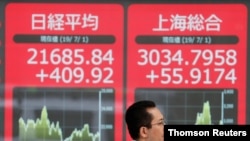Markets in Asia and Europe rallied in response to the results of the highly anticipated weekend meeting between China’s Xi Jinping and President Donald Trump. Analysts say the meeting has helped ease tensions and revive trade talks between the world’s two biggest economies, but reaching a deal is still a prospect that is fraught with uncertainty.
Shares in Tokyo, China and Europe rose to a two-month high on Monday as state media in China welcomed the results, which they argued put the focus back on dialogue and away from threats and counter-threats.
Collision averted
On Saturday, President Trump offered concessions, agreeing to not push ahead with additional tariffs that would’ve covered $300 billion more in Chinese goods, a move that was triggering a backlash from companies at home. He also offered to ease some restrictions on the sale of U.S.- made components to China tech company Huawei.
China has pledged to purchase what Trump said on Twitter was “large amounts of agricultural products from our great Farmers.” Beijing, however, did not make any pledges regarding a blacklist that it is said to be rolling out in response to the U.S. government’s ban on Huawei.
At a regular press briefing on Monday, China’s Foreign Ministry spokesman Geng Shuang did not have new details about when negotiators might meet next. When asked about the kind of promises or concessions China had made during the meeting, Geng Shuang asked rhetorically: “Do you really think China has to make concessions?”
Prior to the meeting, the two sides were both digging their heels in for what some felt looked like the beginning of a new cold war. An opinion piece in the state run China Daily said that while challenges remain, it was an achievement in itself that the two leaders were able to meet and “managed to avert a head-on-collision that appeared imminent.”
Cease-fire 2.0
The piece added, however, that the results of the meeting were very much like the agreement reached last December, when the two leaders met in Buenos Aries, Argentina and agreed to a cease-fire.
“While avoiding the worst-case scenario and allowing more time, and thus a greater likelihood of maneuvering a deal, Saturday's agreement is no guarantee there will be one,” the article said.
Liao Qun, chief economist at China’s state-owned CITIC Bank International says the results were better than expected and a sign that for now the trade dispute would not escalate further. But, negotiation is still far from being over and the divide between the two sides is still wide.
“The [situation] is better off now, but the problem hasn't been solved. It has only been pushed further down the road,” Liao says. He says that while markets are welcoming the news now, they are also concerned about Trump’s unpredictability.
“No matter what he says today, many expect he may change his mind tomorrow and that creates a lot of uncertainty,” Liao says.
Negative list
Chinese state media have portrayed the stand off between the two economies as a struggle against unilateralism and protectionism, with Chinese state media claiming that Beijing was leading the chorus for multilateral trade at the Group of 20 nations meetings last week.
In a speech at G-20, Xi pledged to continue efforts to open up China and jointly boost the global economy. However, Beijing frequently makes pledges that it doesn’t follow through on.
On Sunday, China unveiled a new and shortened negative list for sectors where investment is prohibited, shrinking the total from 48 to 40 sectors that are off limits to foreign investment.
The changes will ease curbs in areas such as telecommunications, petroleum and gas exploration, and mining among others.
Lester Ross, head of American Chamber of Commerce in China’s Policy Committee says the reduction was a narrowing of the list, but in most respects was not that significant.
“I think it is a very, very, modest opening that is not going to persuade people who engage in trade negotiations that China is prepared to move very far and very fast,” Ross said.
Much like other reform pledges, how things work in practice remains to be seen.
Ross says that one bright spot could be the opening of petroleum and gas exploration nationwide, but the real question is which specific areas and territories will be open to foreign companies and whether they will be allowed to equally compete with domestic counterparts.
“If that is what they mean, then that could be significant for companies because what they want is promising territory to engage in their industry,” Ross says.
All countries have some restrictions on investment, including the United States, he notes, and every member must submit a negative list to the World Trade Organization, but “China’s list still remains quite large.”






